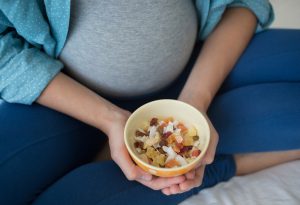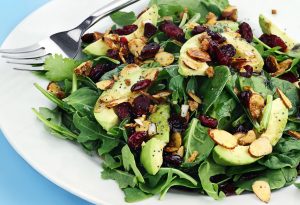In this Article
- Is it Safe to Eat Dry Fruits and Nuts During Pregnancy?
- Benefits of Eating Dry Fruits and Nuts While Pregnant
- Are There Any Side Effects and Risks of Consuming Dry Fruits and Nuts?
- Precautions
- How Much Dry Fruits and Nuts Should You Eat in a Day?
- Recommended Dry Fruits and Nuts During Pregnancy
- Tips for Consuming Dry Fruits and Nuts
When a woman comes to know that she is pregnant, her eating habits change for the better. And naturally, it should, because maintaining a healthy diet during pregnancy is of extreme importance. If you are pregnant, your body will need additional vitamins, minerals, and other essential nutrients to support the healthy growth of the baby. And following a balanced diet is the best way to ensure that you get all the nutrients your body needs to nurture your child. Some healthy snacks that you can include in your pregnancy diet are dry fruits and nuts, as they provide various benefits to both the mother and the baby. But is it completely safe to make them a part of your diet? Find out!
Is it Safe to Eat Dry Fruits and Nuts During Pregnancy?
Dry fruits and nuts are a storehouse of vitamins, minerals, fibre, and amino acids, making them a must-include in an expectant woman’s diet. Dry fruits contain crucial vitamins like B1-B9, C, K, E, and H. They can also satiate hunger easily which can prove helpful while pregnant. This makes them safe for consumption during pregnancy but like with everything else, caution needs to be exercised while consuming dry fruits and nuts during pregnancy as too much of them can lead to various complications. So you can have them, but in moderate quantities.
Benefits of Eating Dry Fruits and Nuts While Pregnant
Dry fruits and nuts are rich in calcium, magnesium, potassium, zinc, and selenium. They are also a good source of antioxidants and they are good at appeasing hunger making them a perfect snack for pregnant women.
- Being rich in dietary fibre, dry fruits help prevent constipation during pregnancy. Hormonal changes can lead to constipation and various other problems during pregnancy. But this problem can be solved by consuming nuts. A high-fibre diet that includes a portion of dry fruits is good for pregnant women.
- Iron is integral to a healthy pregnancy and dry fruits like dried figs and dates and nuts can help you meet your daily requirements of iron.
- Dry fruits can provide you with a substantial amount of Vitamin A which is necessary for the development of the baby’s teeth and bones.
- The potassium found in dry fruits and nuts can help control blood pressure and enhance muscle control.
- The magnesium content in dry fruits and nuts can help in the proper development of nerves and bones in your baby.
- The natural sugar in dry fruits can be digested easily and provide a good dose of energy to your body.
- Dry fruits like prunes or dates are known to strengthen the muscles of the uterus which aids in a smooth delivery. It also reduces the chances of bleeding post delivery.
- Eating dry fruits and nuts during pregnancy is believed to lower the risks of asthma and wheezing in a baby.
- Vitamin E in dry fruits and nuts can help in the development of cells and lungs in the baby. This vitamin can also regulate your blood sugar and help prevent your baby from developing asthma.
Are There Any Side Effects and Risks of Consuming Dry Fruits and Nuts?
When consumed in moderation, dry fruits and nuts are perfectly safe during pregnancy. However, if you eat them in excess, you may face various health complications like:
- Gastrointestinal problems such as gas, bloating, and diarrhoea.
- Weight gain as dry fruits and nuts are rich in calories. And excess consumption can certainly cause health issues.

- Since dry fruits contain natural sugars like fructose, they can cause tooth decay if you don’t follow proper dental hygiene.
Precautions
Healthy as they are, it is important to keep in mind a few precautions when consuming dry fruits during pregnancy.
- Choose sundried fruits instead of those processed in a plant. This way you can avoid toxin known as acrylamide that is found in food that is heated for an extended period. It is a carcinogen and can have adverse effects on the nervous system and fertility.
- Check to see whether the dried fruits you buy have added sugar or not. Dry fruits contain a certain amount of natural sugars but some brands also contain added sugar. Avoid them in all cases.
- Sometimes, packaged dry fruits and nuts have added preservatives. They may contain sulphur dioxide that can lead to allergic reactions or respiratory issues.
- The drying process which these fruits are subjected to can lead to an increase in calories. So you need to be careful about how much you eat to regulate your calorie intake.
- Try to buy organic and preservative-free dry fruits from reputed sellers and buy only what you can eat in a month’s time.
- If buying from local vendors, look out for bugs, mould, or dirt. You can also taste a piece before you buy in bulk.
- Store dry fruits in a clean and dry container and place them in the refrigerator to prevent them from spoiling.
How Much Dry Fruits and Nuts Should You Eat in a Day?
Dry fruits contain a lot more calories than fresh fruits. Some nuts are also high in calories. So, you need to watch what you eat especially during pregnancy. It is recommended that you do not eat more than 100 grams of dry fruits & nuts in a day during this time. For instance, you could eat four to seven pieces of almonds, about four halves of walnuts, two dates, and about eight pistachios at a time.

Recommended Dry Fruits and Nuts During Pregnancy
Almost all dry fruits and nuts are recommended to pregnant women. If you are pregnant, make sure that you include the following in your diet on a regular basis during this special time in your life.
| Dry Fruits and Nuts | Nutrients | Calories/Cup | How It Helps |
| Almonds | Calcium, magnesium, protein, riboflavin, Vitamin E | 529 |
|
| Dried apricots | Fibre, Vitamin A, Copper, Vitamin E | 381 |
|
| Raisins | Iron and fibre | 488 |
|
| Walnuts | Omega-3 fats | 720 |
|
| Cashew nuts | Phosphorous | 640 |
|
| Dried apples | Fibre, potassium | 208 |
|
| Pistachios | Copper | 330 |
|
| Dates | Fibre | 502 |
|
| Dried figs | Fibre | 371 |
|
| Peanuts | Protein | 828 |
|
Tips for Consuming Dry Fruits and Nuts
There are a lot of misconceptions and myths associated with the consumption of dry fruits and nuts during pregnancy. Cashew nuts, almonds, apricots, prunes, raisins, dates, walnuts, and pistachios are some dry fruits and nuts that are good for pregnant women. Since dry fruits are nutritious, you should aim to include the recommended quantity in your diet each day. Here are some ways you can do this:
- Most dry fruits are good for pregnant women and can be consumed raw. They also make for a healthy snack when hungry during pregnancy.
- You can also add nuts and dry fruits to your salads, sandwiches, and desserts like puddings or custards.

- Make your own dry fruit candy by mincing dates and walnuts and rolling them in some grated coconut. Store it in the refrigerator for consumption. You can consume them for up to ten days.
- Some types of dry fruits can be hard to bite into or chew. So, you can first soak them in water before consuming them.
Pregnancy is a time when you must eat healthy food and focus on your well-being as well as your child’s. It is important not to get overwhelmed when making food choices. You will get a lot of advice from your relatives and family members, and this flood of information on what to eat and what not to can sometimes confuse you. But don’t worry. Consult your doctor to find out what is best for you and your child.









